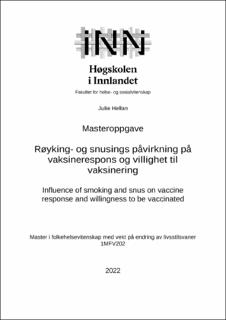| dc.contributor.advisor | | |
| dc.contributor.author | Hellan, Julie | |
| dc.date.accessioned | 2022-09-20T16:10:37Z | |
| dc.date.available | 2022-09-20T16:10:37Z | |
| dc.date.issued | 2022 | |
| dc.identifier | no.inn:inspera:112394756:51308584 | |
| dc.identifier.uri | https://hdl.handle.net/11250/3019307 | |
| dc.description.abstract | Bakgrunn I januar 2021 startet massevaksineringen av befolkningen i Norge mot koronaviruset. Denne masteroppgaven undersøker om risikoatferd som røyking og snusing kan påvirke responsen av koronavaksinen, og om risikoatferd som røyking og snusing kunne føre til at annen risikoatferd som å ikke følge vaksineanbefalingene om den tredje dosen koronavaksine eller at man fulgte vaksineanbefalingene senere enn andre.
Metode Det ble benyttet kvantitativ metode, tverrsnittsdesign og longitudinelldesign for å gjøre statistiske sammenligninger mellom gruppene. Utvalget besto av 514 deltakere med inflammatorisk tarmsykdom som brukte immunhemmende medikamenter. Det ble benyttet deskriptive analyser, krysstabeller, slutningsstatistikk og regresjonsanalyser for å komme frem til resultatene.
Resultater: Resultatene viser at røyking eller snusing ikke har betydning for vaksineresponsen etter to doser koronavaksine. Alder og kjønn kan ha betydning for om man følger vaksineanbefalingene, mens risikoatferd som røyking og snusing ikke har noen betydning for om man følger vaksineanbefalingene, eller om man følger anbefalingene på et senere tidspunkt enn andre.
Konklusjon: I denne masteroppgaven fant man at røyking og snusing ikke påvirker vasksineresponsen etter koronavaksinering. Man fant også at røyking og snusing ikke hadde betydning for om man fulgte vaksineanbefalingene.
Hovedbudskap: Vaksinasjon er viktig for flokkimmunitet, og det kan være viktig å detektere faktorer som påvirker vaksineresponsen, og faktorer som gjør at enkelte velger å ikke følge vaksineanbefalingene. | |
| dc.description.abstract | Background: In January 2021, the mass vaccination of the population in Norway against covid-19 began. This master's thesis investigates whether risk behaviors such as smoking and snus can affect the response of the covid-19 vaccine, and whether risky behaviors such as smoking and snus could lead to other risky behaviors such as not following the vaccine recommendations for the third dose of covid-19 vaccine or following the vaccine recommendations later than others.
Method: Quantitative methods, cross-sectional design and longitudinal design were used to make statistical comparisons between the groups. The sample consisted of 514 participants with inflammatory bowel disease who used immunosuppressive drugs. Descriptive analyzes, cross-tabulations, inference statistics and regression were used to reach the results.
Results: The results show that smoking or snus does not affect the vaccine response after two doses of coronary vaccine. Age and gender can influence whether you follow the vaccine recommendations, while risky behaviors such as smoking and snus did not have affect whether you follow the vaccine recommendations, or whether you follow the recommendations later than others.
Conclusion: In this master's thesis it was found that smoking and snus do not affect the vaccine response after vaccination against covid-19. It was also found that smoking and snus did not affect the choice about following the vaccine recommendations.
Main message: Vaccination is important for herd immunity, and it can be important to detect factors that affect the vaccine response, and factors that make some people choose not to follow the vaccine recommendations. | |
| dc.language | nob | |
| dc.publisher | Inland Norway University | |
| dc.title | Røyking- og snusings påvirkning på vaksinerespons og villighet til vaksinering | |
| dc.type | Master thesis | |
